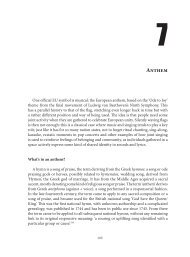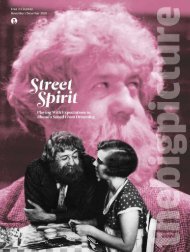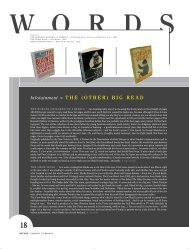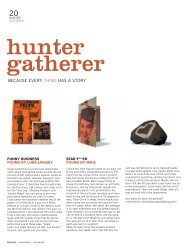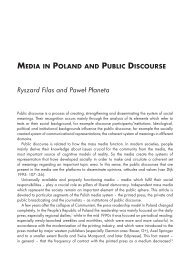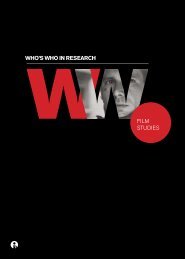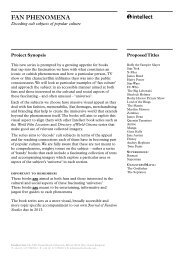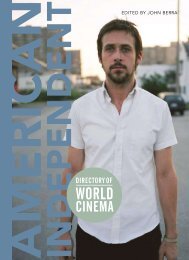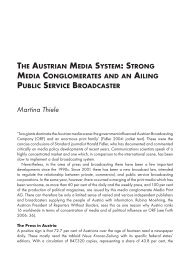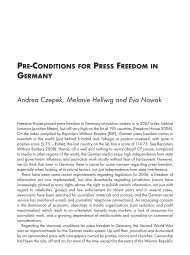- Page 1 and 2:
who’s who in research visuAl Arts
- Page 3 and 4:
who’s who in research visuAl Arts
- Page 5 and 6:
Rubedo Keywords Beatriz Acevedo Ang
- Page 7 and 8:
University of Illinois, Chicago Key
- Page 9 and 10:
Giovanni Aloi Roehampton University
- Page 11 and 12:
Keywords photography, art object, v
- Page 13 and 14:
Roy Ascott Planetary Collegium, 64
- Page 15 and 16:
Fernando Leal Audirac Keywords futu
- Page 17 and 18:
Susan Bagwell London Metropolitan U
- Page 19 and 20:
Naren Barfield Glasgow School of Ar
- Page 21 and 22:
practice, sense activity Jiří Bar
- Page 23 and 24:
Zygmunt Bauman University of Leeds,
- Page 25 and 26:
Ruth Beer Emily Carr University of
- Page 27 and 28:
Joana Duarte Bernardes Universidade
- Page 29 and 30:
active learning Iain Biggs Universi
- Page 31 and 32:
Kingston University, Faculty of Art
- Page 33 and 34:
Erik Bohemia Northumbria University
- Page 35 and 36:
Roy Boyne Durham University, School
- Page 37 and 38:
time, binary logic, unity of knowle
- Page 39 and 40:
Artificial Intelligence Laboratorz,
- Page 41 and 42:
Hilary Bungay Canterbury Christ Chu
- Page 43 and 44:
Joel Cahen United Kingdom Keywords
- Page 45 and 46:
David Campany University of Westmin
- Page 47 and 48:
Carlos Castellanos Simon Fraser Uni
- Page 49 and 50:
Simon Chadwick Glasgow School of Ar
- Page 51 and 52:
Caroline Chapain University of Birm
- Page 53 and 54:
Laura Chessin Virginia Commonwealth
- Page 55 and 56:
Martha Christopoulou Keywords Greec
- Page 57 and 58:
Alissa Clarke De Montfort Universit
- Page 59 and 60:
Sheila Cliffe Jumonji Gakuen Women'
- Page 61 and 62:
Monika Codourey Keywords society an
- Page 63 and 64:
Alan Collins University of Portsmou
- Page 65 and 66:
Staffordshire University, Flaxman B
- Page 67 and 68:
Diana Crane University of Pennsylva
- Page 69 and 70:
Keywords transnational, cinema, tec
- Page 71 and 72:
Nina Czegledy KMDI, University of T
- Page 73 and 74:
Nina Danino Keywords Katherina Dank
- Page 75 and 76:
Keywords text, theory/practice, ree
- Page 77 and 78:
Sheila de Rosa Keywords motherhood,
- Page 79 and 80:
Rea Dennis University of Glamorgan,
- Page 81 and 82:
Val Diggle University College Falmo
- Page 83 and 84:
Margaret Dolinsky HR Hope School of
- Page 85 and 86:
Jim Drobnick Keywords Johanna Druck
- Page 87 and 88:
Keywords design research, research
- Page 89 and 90:
Buthayna Eilouti Prince Sultan Univ
- Page 91 and 92:
culturecomplexity theory, purposele
- Page 93 and 94:
Illinois Wesleyan University, 1312
- Page 95 and 96:
Dita Judith Federman University of
- Page 97 and 98:
Terry Finnigan University of the Ar
- Page 99 and 100:
Swinburne University of Technology,
- Page 101 and 102:
Rebecca Fortnum Camberwell College
- Page 103 and 104:
Jill Franz Keywords interior design
- Page 105 and 106:
education, attitude, mental imagery
- Page 107 and 108:
Julia Gaimster London College of Fa
- Page 109 and 110:
design, music industry Mette Gårdv
- Page 111 and 112:
Emil Gaul Nyíregyháza College, 44
- Page 113 and 114:
Sciences, Anglia Ruskin University,
- Page 115 and 116:
Gloria Gómez-Diago Rey Juan Carlos
- Page 117 and 118:
commemoration, representation, reme
- Page 119 and 120:
Keywords practice, dream-work, imag
- Page 121 and 122:
London, Scotland, W1F 8GQ, United K
- Page 123 and 124:
Amsterdam School of the Arts, P.O.
- Page 125 and 126:
Chelsea Haines Keywords Catherine H
- Page 127 and 128:
Coventry University, Institute for
- Page 129 and 130:
London Metropolitan University, Sir
- Page 131 and 132:
Rob Harle Deakin University Alumni
- Page 133 and 134:
David Harte Birmingham City Univers
- Page 135 and 136:
Keywords Australian literature, Aus
- Page 137 and 138:
Andy Hewitt University of Wolverham
- Page 139 and 140:
legibility, dine (Spring, 2007), No
- Page 141 and 142:
education, creative briefs, creativ
- Page 143 and 144:
Zhifan Hu Education Science College
- Page 145 and 146:
Laura Hurd Clarke University of Bri
- Page 147 and 148:
Sharon Irish University of Illinois
- Page 149 and 150:
4059, Australia Keywords media, des
- Page 151 and 152:
University of Southern California K
- Page 153 and 154:
learning, learning contracts, elect
- Page 155 and 156:
Zachary Jones Arizona State Univers
- Page 157 and 158:
Themina Kader University of Wiscons
- Page 159 and 160:
Professor, Art and Art Education, T
- Page 161 and 162:
Joachim Kettel University of Educat
- Page 163 and 164:
Keywords freelance writer, actor, d
- Page 165 and 166:
Adam Kossoff Keywords video, moving
- Page 167 and 168:
Sheng Kuan Chung University of Hous
- Page 169 and 170:
George Kyeyune Makerere University,
- Page 171 and 172:
Kingdom Keywords gynaecology, art t
- Page 173 and 174:
K. W. Lau The Hong Kong Polytechnic
- Page 175 and 176:
Lucia Leão Sao Paulo Catholic Univ
- Page 177 and 178:
Jason Lee University of Derby, Head
- Page 179 and 180:
United States of America Keywords p
- Page 181 and 182:
Weitao Li Keywords Emanuel Licha É
- Page 183 and 184:
Peeter Linnap Tartu Art College Key
- Page 185 and 186:
Keywords art, design, photography,
- Page 187 and 188:
Lilly (Li-Fen) Lu Northern Illinois
- Page 189 and 190:
Mary Maclean Keywords Augé, docume
- Page 191 and 192:
Goldsmiths College, University of L
- Page 193 and 194:
Francesco Mariotti Switzerland Keyw
- Page 195 and 196: College, 80 Roehampton Lane, London
- Page 197 and 198: of organizations, Danish film indus
- Page 199 and 200: David McConville The Elumenati, Noo
- Page 201 and 202: Keywords culture, politics, capital
- Page 203 and 204: Hasso-Plattner-Institut für Softwa
- Page 205 and 206: Hall, Gambier, Ohio, 43022, United
- Page 207 and 208: Kathy Miraglia Keywords integration
- Page 209 and 210: education, sense of place completin
- Page 211 and 212: Education, Lamoureux Hall (LMX), 14
- Page 213 and 214: Christine Ballengee Morris The Ohio
- Page 215 and 216: Julia Moszkowicz Bath Spa Universit
- Page 217 and 218: Stuart Munro Bartlett School of Arc
- Page 219 and 220: Shaun Murray Eniatype Keywords arch
- Page 221 and 222: Planning and Landscape Architecture
- Page 223 and 224: Darren Newbury Birmingham City Univ
- Page 225 and 226: Martha Patricia Niño Mojica Univer
- Page 227 and 228: Calcutta House, London, E1 7NT, Uni
- Page 229 and 230: Nana Afia Opoku-Asare Kwame Nkrumah
- Page 231 and 232: Jane Osmond Coventry University, Pr
- Page 233 and 234: Daniel Palmer Monash University, Me
- Page 235 and 236: Clare Park Keywords power, dyskines
- Page 237 and 238: Lissa Paul Brock University, Depart
- Page 239 and 240: Keywords research into practice, th
- Page 241 and 242: Denitsa Petrova Edinburgh College o
- Page 243 and 244: Sociology and Philosophy, Amory Bui
- Page 245: Andrea Polli IFDM c/o College of Fi
- Page 249 and 250: Keywords tacit knowledge, community
- Page 251 and 252: Keywords creativity, intercultural
- Page 253 and 254: Barbara Rauch Ontario College of Ar
- Page 255 and 256: Joanna Rees The School of Art and D
- Page 257 and 258: Ricardo Reis Escola Superior de Edu
- Page 259 and 260: Mofizur Rhaman University of Dhaka,
- Page 261 and 262: Olivier Richon Royal College of Art
- Page 263 and 264: Kathy Ring York St John College, 2
- Page 265 and 266: Winchester, Hampshire, United Kingd
- Page 267 and 268: Andrés Romero-Jódar University of
- Page 269 and 270: Nick Rowe York St John University,
- Page 271 and 272: Chris Rust Sheffield Halam Universi
- Page 273 and 274: Centre for Learning & Teaching in A
- Page 275 and 276: esearch, oral history, identity Cla
- Page 277 and 278: Christian W. Schneider University o
- Page 279 and 280: Keywords hybrid invention, machinic
- Page 281 and 282: chronometry, perception, visual tur
- Page 283 and 284: Lynette Sheridan Burns University o
- Page 285 and 286: Kaye Shumack University of Western
- Page 287 and 288: Marc Singer Howard University, Depa
- Page 289 and 290: Keywords early childhood education,
- Page 291 and 292: Jimmy Smith Independent Scholar Key
- Page 293 and 294: Development, Sydney, New South Wale
- Page 295 and 296: Jeremy Spencer Keywords aesthetic t
- Page 297 and 298:
Daniel T. Stein Keywords Lee Smith,
- Page 299 and 300:
national survey, resilience Theodor
- Page 301 and 302:
Wendy Strauch-Nelson Keywords Janez
- Page 303 and 304:
Heather Symonds University of the A
- Page 305 and 306:
Keywords teacher education, art edu
- Page 307 and 308:
Nicholas Theisen University of Mich
- Page 309 and 310:
Keywords robot, façade, environmen
- Page 311 and 312:
Nottingham, NG1 4BU, United Kingdom
- Page 313 and 314:
of Drama, School of Arts, Jarman Bu
- Page 315 and 316:
Keywords spoken in eastern Nepal. H
- Page 317 and 318:
Moraiti Tzeni United Kingdom Keywor
- Page 319 and 320:
University of California, San Franc
- Page 321 and 322:
Keywords art history, contemporary
- Page 323 and 324:
Shilpa Venkatachalam University of
- Page 325 and 326:
Keywords body representation, visua
- Page 327 and 328:
global information/communication ag
- Page 329 and 330:
Aylwyn Walsh University of Northamp
- Page 331 and 332:
Helena Webster Oxford Brookes Unive
- Page 333 and 334:
Central St. Martins College of Art
- Page 335 and 336:
Dietmar Wiegand Keywords network de
- Page 337 and 338:
Keywords collaboration, Goat Island
- Page 339 and 340:
David Wood Vanderbilt University, D
- Page 341 and 342:
Natalie Woolf Keywords design modes
- Page 343 and 344:
Christine Woywod University of Wisc
- Page 345 and 346:
Ming-Ying Yang National United Univ
- Page 347 and 348:
Keio Research Institute at SFC Keyw
- Page 349 and 350:
Malin Zimm Stockholm, Sweden Keywor
- Page 351 and 352:
aesthetics of nature Andy Hamilton
- Page 353 and 354:
art appreciation Clovis Blackwell M
- Page 355 and 356:
assessment task Mark Evans associat
- Page 357 and 358:
ook art Johanna Drucker book arts M
- Page 359 and 360:
coherent design curriculum Elson Sz
- Page 361 and 362:
constructivist approach Julian Mali
- Page 363 and 364:
creative writing Matthew Bushell Ma
- Page 365 and 366:
cybernetic observatory Luiz Velho c
- Page 367 and 368:
development education Catherine Gom
- Page 369 and 370:
dyeing processes Nana Afia Opoku-As
- Page 371 and 372:
environmental control Will Thorne e
- Page 373 and 374:
Pavel Büchler Jane Darke Piotr Dum
- Page 375 and 376:
John Steers glossary Mark Leahy gno
- Page 377 and 378:
Carl Vilbrandt hypermedia Cláudia
- Page 379 and 380:
Victor I. Ukaegbu interactions Juli
- Page 381 and 382:
knowledge Amanda Beech Carl-Peter B
- Page 383 and 384:
managers Hélène Martin-Brelot man
- Page 385 and 386:
methodology Keren Barzilay-Shechter
- Page 387 and 388:
narrative polyphony A. David Lewis
- Page 389 and 390:
origin Fernando Leal Audirac origin
- Page 391 and 392:
Peter Burleigh Pavel Büchler Sheen
- Page 393 and 394:
practice-based Daniela Büchler pra
- Page 395 and 396:
qualitative research methods Tiiu P
- Page 397 and 398:
esilience Don Stewart responsive ar
- Page 399 and 400:
situated learning Anja Kraus Kazuji
- Page 401 and 402:
strip-photography Maarten Vanvolsem
- Page 403 and 404:
technologized body Paul Woodrow tec
- Page 405 and 406:
trans-disciplinary domains Mogens J
- Page 407 and 408:
Anne Lord Stuart Munro Brigitta Zic
- Page 409:
world-view Patricia Macdonald wow f



